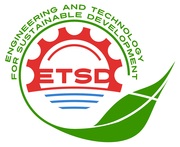 | ICETSD2026: International Congress on Engineering and Technology for Sustainable Development University of Buraimi (UOB), Oman Buraimi, Oman, April 8-9, 2026 |
| Submission link | https://easychair.org/conferences/?conf=icetsd2026 |
| Abstract registration deadline | July 26, 2025 |
| Submission deadline | November 30, 2025 |
| Regular registration deadline | January 15, 2026 |
Introduction
The International Congress on Engineering and Technology for Sustainable Development is an international platform that brings together people from all over the world to share knowledge, research findings, recent advances, and best practice. The congress provides opportunities for engineers, economists, architects, social scientists, corporate executives, policy makers, government officials, academics, and practitioners to meet one another, and establish networks for scientific exchange and technical cooperation.
Context
Climate change is one of the most critical global challenges of our time. Examples of its adverse consequences include extreme weather patterns leading to flooding, droughts, heat waves, storms, and other extreme weather-related events. Other challenges include air pollution, water scarcity, food insecurity and loss of biodiversity. The scale of the challenge is enormous; yet research outputs in areas that are central to addressing environmental sustainability remain marginal.
The United Nations has declared the years 2024-2033 as the International Decade of Science for Sustainable Development with the principle aim of finding solutions to these global challenges. Science is a common good for humanity and offers fundamental support to a sustainable development model. Engineering and Technology will continue to play a pivotal role in improving the quality of human life, preservation of the planet and delivery of the Sustainable Development Goals.
Themes and Topics
The Scientific Committee invites papers on the following topics, grouped into thematic tracks. The list is not exhaustive:
Track 1: Renewable Energy and Smart Infrastructure
Renewable Energy Systems, Technologies, and Storage Solution
Smart Grids and Digital Infrastructure for Energy Management
Energy Efficiency and Smart Technologies for Sustainable Buildings
Resilient Infrastructure and Risk Mitigation Strategies
Integration of Renewable Energy in Urban Planning
Circular Economy in Energy and Infrastructure
Track 2: Water, Environment, and Climate Resilience
Innovative Technologies for Water Supply and Wastewater Management
Advancing Environmental Impact Assessments: Tools and Case Studies
Climate-Resilient Water Infrastructure
Nature-Based Solutions for Water and Climate Resilience
Water-Energy Nexus in Sustainable Development
Mitigating Microplastics and Emerging Contaminants in Water Systems
Integrated Water Resource Management for Climate Resilience
Track 3: Engineering Innovations for Food Security and Health
Agri-Technology and Food Security Solutions
Sustainable Water Management for Agriculture
Environmental Engineering Solutions for Global Public Health Challenges
Smart Healthcare Systems and Technological Innovations
Food Waste Reduction and Management Technologies
Biotechnology for Nutritional Security
Smart Sensors and Data Analytics for Agriculture
Track 4: Data Science, AI, and Smart Technologies
Machine Learning for Predictive Analytics in Sustainability
IoT and Big Data Analytics for Smart and Sustainable Systems
Digital Twins for Sustainable Infrastructure
Block chain for Transparent and Sustainable Resource Management
Edge Computing for Smart and Sustainable Systems
AI and Robotics technologies
Augmented and Virtual Reality for Sustainable practices
Ethical Implications of AI in Sustainability
Track 5: Sustainable Transportation Systems
Smart Transportation Systems and Traffic Management
Sustainable Urban Mobility Solutions
Transport Energy Efficiency, Environmental Quality, and Disaster Resiliency
Renewable Energy for Transportation: Electricity, Green Hydrogen, and Bioenergy
High-Speed Railway Systems
Transportation Economics, Logistics, and Supply Chain Management
Zero-Emission Vehicles (e.g., Electric Vehicles) and Infrastructure Design
Sustainable Pavement Design, Materials, and Performance Analysis
Track 6: Sustainable Engineering Business Practices
Circular Economy Solutions and Resource Optimization Practices
Carbon Pricing, Trading, and Offset Mechanisms
Environmental Economics and Policy Innovations for Sustainable Development
Integrating Environmental Impact Assessments into Business Decision-Making
Green Finance and Investment Strategies for Sustainable Engineering
Corporate Social Responsibility and Sustainable Business Models
Entrepreneurship and Innovation for Sustainable Engineering Practices
Key Dates:
Abstract submission deadline: 30 September 2025
Notification of abstract acceptance 15 October 2025
Full paper submission 30 November 2025
Notification of full paper acceptance 30 December 2025
Camera-ready paper 15 January 2026
Regular registration deadline 15 January 2026
Late registration deadline 11 February 2026
Conference Proceedings
All papers submitted to the conference will be peer-reviewed by at least two independent reviewers. All accepted papers will be published in conference proceedings with an ISBN number. The following journals have accepted to collaborate with the conference and accept the best papers presented for publication subject to meeting their own criteria. The journals are:
Journal of Engineering, Design and Technology.
Construction Economics and Building.
Proceedings of the Institution of Civil Engineers: Management, Procurement and Law.
Proceedings of the Institution of Civil Engineers: Municipal Engineer.
Registration Fees
|
Registrant |
Early Bird (Fees in OMR) |
Late Registration fees after 30th November 2025 |
|
Attendance only |
50 |
50 |
|
Presenter (In-person) |
75 |
100 |
|
Presenter (online) |
50 |
50 |
|
Students |
Free |
Free |
The conference will be held in hybrid format. Each accepted paper must be fully registered by the main author before 30th December 2025. All students must present proof of identity by emailing the ID to benefit from free registration.
Congress Organising Committee
Dr. Peter Akadiri (Chairman) Professor Sam Wamuziri
Dr. Umar Safdar Dr. Osama Ahmad Marzouk
Dr. Mohammad Ali Sahraei (Secretary) Dr. Gopal Rathinam
Dr. Ahmed Anwar A. Kandil Dr. Tauseef Ahmed
Dr. Nadir Kamal Salih Idries Dr. Madan Kumar Sharma
Mr. Arshad Mehmood Ms. Sawsan Mohammed Hamed Domi
Ms. Sanaa Humaid Khamis Al Senani Mr. Yahya Said Al Kaabi
Ms. Alaya Hamyar Ali Al Azzani Ms. Maryam Juma Khalfan Al Kaabi
Ms. Fakhra Ahmed Al Shamsi Eng. Ahmed Said Rashid Al Maqbali
Eng. Omar Abdullah Sultan Al Shibli Eng. Sheikha Al Naqbi
